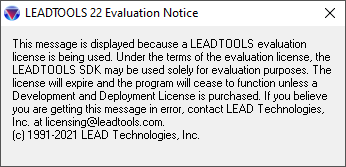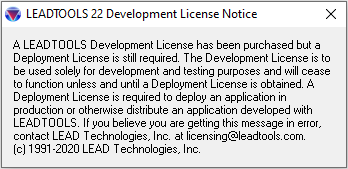About LEADTOOLS Deployment Licenses
To deploy LEAD's intellectual property with End User Software, customers must purchase a "Deployment License". The deployment license terms and conditions vary depending on whether the application developed with the LEAD SDK ("End User Software") is being used internally by the customer's employees, is being hosted by the customer for use by third parties, or is being commercially distributed to end users. For more information on deployment types, refer to Deployment Types.
The Evaluation Licensing Dialog
When users download an evaluation version of a LEAD SDK and register for a portal account, they will receive a set of temporary license files/unlock keys that allows them to install and develop with the LEAD SDK. Users will notice that when compiling an application or running LEADTOOLS demos, a dialog box will occasionally appear to remind them they are using an evaluation version and that the temporary license files will expire. For example:

The Development License Dialog
When a customer purchases a development license to a LEAD SDK, the customer will receive a developer license file with a developer key . This development license file will display a license dialog reminding the customer of the requirement to obtain a Deployment License File for deployment. The development license will expire 6 months following installation and may be extended by LEAD if necessary.

The goal in providing the development license is to allow a developer to complete development of the End User Software while the deployment license documentation is being completed/approved. After the development license file has expired, the toolkit will display an "expired" message and will cease to function. After the expiration date, the developer must use a Deployment License File for the LEAD SDK to function.
Steps for Obtaining a Deployment License File
- Register for a portal account by either downloading the latest evaluation SDK or by filling out the registration form.
- Within the portal, fill out your project details and a LEADTOOLS representative will reach out to you regarding your individual application needs.
- Purchase applicable Development and Deployment Licenses and, if applicable, send in the signed Commercial Deployment License Agreement.
- Upon completion of 1-3, LEAD will provide the applicant with the Deployment License File(s), an invoice/statement identifying the deployment licenses purchased, and a counter-signed copy of the Commercial Deployment License Agreement, if applicable.
Deployment License Application: Commercial Deployment License
To obtain a Deployment License File(s) to deploy LEAD SDK intellectual property with the End User Software, the customer must first complete a Deployment License Application form. The purpose of this form is to identify the type of deployment license required by the customer, the various LEAD modules that will be deployed, and to establish the pricing and other terms and conditions for the deployment license. Completion of the application is required as a condition of obtaining a Deployment License File. After LEAD has processed the Deployment License Application, LEAD will provide the customer with a Deployment License Fee quotation covering the Deployment Licenses that the customer needs to purchase.
Purchasing Deployment Licenses and Commercial Deployment License Agreements
Deployment Licenses for internal deployments must be purchased before the customer can receive Deployment License File(s). After a customer has received an official quotation from LEAD, deployment licenses may be purchased with a valid credit card, or the customer may issue a purchase order (provided the customer has been approved for credit purchases by LEAD's accounting department). Certain products require the purchase of a server deployment license as a condition of obtaining the deployment license. For example, if a customer is using LEAD's HTML5/JavaScript libraries, these must be deployed to a web server for deployment and use and therefore a server license is required for deployment. Note that the License Files associated with the HTML5/Javascript libraries are tied to specific domain(s) of LEAD's customer or LEAD's customer's customer. If a customer is an ISV/OEM selling End User Software or is hosting the End User Software for use by the customer's customers, deployment licenses may be purchased at the prices and in the manner set forth in the Commercial Deployment License executed by the customer and LEAD.
Grant of Deployment License: Deployment License Files and Unlock Instructions
After a customer has completed the Deployment License Application form, purchased the necessary deployment licenses, and, if applicable, executed and returned a Commercial Deployment License Agreement, LEAD will provide the customer with Deployment License File(s), and the instructions to eliminate the licensing dialog. Note that the Deployment License Files are different, depending on whether the deployment licenses are for deployment to desktops or servers, and also whether the deployment involves an HTML5/JavaScript-based LEAD component. It is important that customers identify the correct type of deployment licenses that they need while completing the Deployment License Application and purchasing the deployment licenses. After the customer has received the Deployment License File(s) the customer will be able to deploy the End User Software into production without any nag messages or expiration notices. Typically, utilizing the Deployment License Files and developer keys will only take a couple of minutes. Deployment licenses purchased by the customer for internal deployments and hosted service deployments will be evidenced by an invoice/statement, which will identify the type of deployment license, the quantity of deployment licenses granted, and the duration of the licenses.
✅ IMPORTANT
LEAD packages SDKs so that all product sets are enabled in the installation while the SDK is in evaluation mode or using the development license file and is displaying the license dialog/watermark referred to above. Therefore, if the eval dialog or development license dialog is being displayed, substantially ALL FEATURES of the entire product line will be enabled Once the deployment license has been purchased and the customer utilizes the Deployment License File(s) provided by LEAD, only the features that are included in the specific LEAD SDK(s) that customer has licensed will be available for the platform(s) purchased. Any features of products and platforms that are not under the license will be locked. Customers should consult the help file or contact the LEAD sales department to determine which product configuration includes the functions the customer plans to use.
Record Keeping and Reporting
The Commercial Deployment License Agreement requires that an ISV/OEM customer commercially distributing software must account to LEAD by sending a quarterly report indicating the number of deployments the customer made during each quarter. LEAD will email customer the link to the report portal on a quarterly basis, well in advance of the due date for reporting. The form is very simple to complete and submit through the report portal. For internal deployment licenses and hosted service deployments, an annual deployment activity report is required to determine that the customer has the appropriate number of deployment licenses for its install base of End User Software. LEAD does offer site licenses and enterprise licenses for some products. With site licenses and enterprise licenses, the customer is not required to report deployment quantities or pay per copy deployment fees. The cost of site licenses and enterprise licenses are quoted on a case-by-case basis, considering factors such as an estimated number of users, the functionality involved, and the customer's revenue model. To inquire further about site and enterprise deployment license options, please send an email to [email protected] or call our sales department at +1-704-332-5532.
License Termination and Suspension
Customers must comply with the reporting requirements described above to maintain their license. If a customer does not submit deployment reports, the customer's account will be flagged, and the customer will not be eligible to receive technical support or upgrades. If a customer is not actively deploying the application, the customer can request suspension of the reporting requirement. In addition, a customer can also voluntarily terminate the license and be relieved of the obligation to complete the deployment reports going forward by certifying that the customer is not developing nor deploying software that uses LEADTOOLS.
Duration of Deployment Licenses
Unless otherwise stated on customers invoice/statement, Deployment Licenses for Internal Deployments and Hosted Service Deployments are valid for one (1) year and may be renewed on an annual basis. Deployment Licenses for Commercial Deployments will have the duration set forth in the applicable Commercial Deployment License Agreement executed by LEAD and the customer.
New Versions
For commercial deployments, if a new major version of the LEAD SDK is included in an upgrade to the End User Software, each user that is upgraded will require an upgrade deployment license. The upgrade deployment license price is 40% of LEAD's standard price of the deployment license for the new version of the LEADTOOLS SDK for the applicable quantity of licenses being purchased. Any prepaid deployment licenses that have not been deployed at the time the customer licenses a major new version of the LEAD SDK will be carried forward and may be applied to deployments of the End User Software made with the major new version of the LEAD SDK. A customer is under no obligation to update previously deployed user or client licenses with the new version of the End User Software that includes the major new version of the LEAD SDK. Customers also have the option of purchasing annual maintenance for their deployment licenses. Annual maintenance for a deployment license is priced at 20% per year and entitles the customer to upgrade the deployment license with any new versions released during the maintenance period. No additional deployment licensing is required for minor version updates. For internal deployments and hosted services, the annual deployment license fee includes maintenance, so a customer is licensed to deploy major new versions of LEADTOOLS to the customer's validly licensed deployments for as long as the customer continues to renew the licenses.
For more information, refer to:
Deployment License Application
